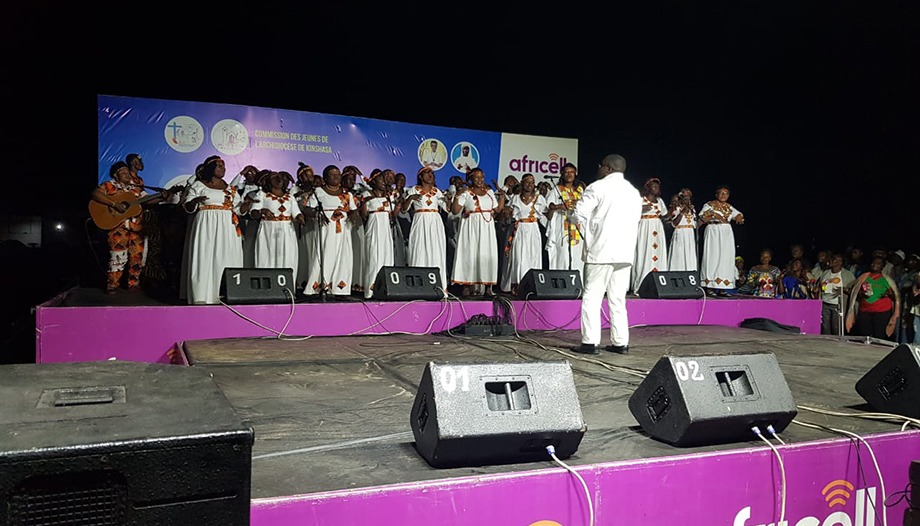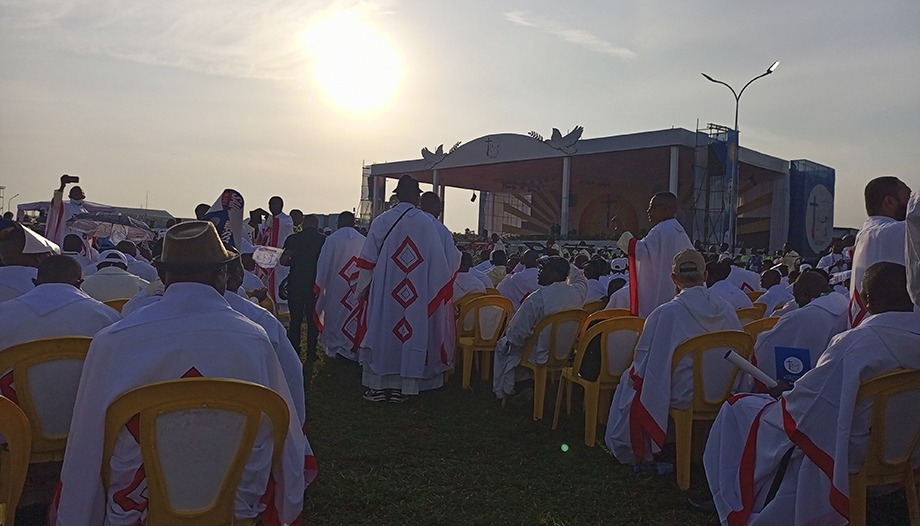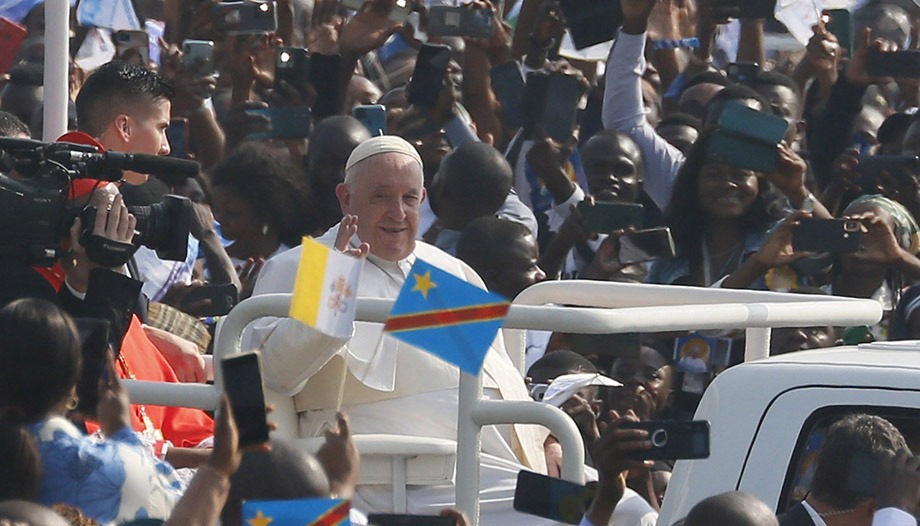"Bandeko, bobóto" [Brothers and sisters, peace] Reply: "Bondeko [Fraternity], bondéko". "Esengo, joy: the joy of seeing you and meeting you is great; I have longed for this moment, thank you for being here!" said Pope Francis to the crowd that gathered at the Ndolo airport (Kinshasa), to attend the Eucharistic Celebration with the Pope.
From there, Alberto Garcia Marcos, a priest, points out the impressive welcome received by the Pope "worthy of the faith and hope of the Congolese people in all that the Pope represents. A 25 km long line without flashing lights accompanied Francis from the exit of the airport to the National Palace".

Many people spent the night at the Ndolo airport, where the Mass took place, and it went by quickly. During that time, García Marcos pointed out, there were songs, dances and confessions: "Abbé Odón, one of the priests who heard confessions, began at nine o'clock at night and finished at 2:30 in the morning. Some choirs helped to liven up the passing of time".
At four o'clock in the morning, "little by little the faithful arrived and crowded the airport. Like a game of tetris, the squares were filling up. At 6:30 a.m. there was already an electric atmosphere. Abbé Kola, threatened the waiting with the direction of various songs in agreement with the people. Difficult to explain if you don't live it".
The objective was the Mass, to pray for peace and justice, and the Pope gave practical advice: that everyone should take out their crucifix and embrace it, "to share their wounds with those of Jesus".
The Congolese present represented in some way the 50 million Catholics in the country. Democratic Republic of the Congo (DRC), with its more than 60 bishops and 6,160 priests (4,200 diocesan and 1,900 religious), together with the Archbishop of Kinshasa, Cardinal Fridolin Ambongo.
Joy and peace
The Holy Father began his homily by speaking of joy, of Easter joy, in order to relate it to peace. "The Gospel has just told us that the joy of the disciples was also great on Easter night, and that this joy arose 'when they saw the Lord' (Jn 20:20). In this climate of joy and amazement, the Risen Lord speaks to his disciples. And what does he say to them? First of all, these words: 'Peace be with you' (v. 19). It is a greeting, but it is more than a greeting: it is a sending".
"Because peace, that peace announced by the angels on the night of Bethlehem (cf. Lk 2:14), that peace that Jesus promised to leave to his own (cf. Jn 14:27), is now, for the first time, solemnly given to the disciples," the Pope noted.
He went on to ask: "How can we preserve and cultivate the peace of Jesus? He himself points us to three sources of peace, three wellsprings to continue to nourish it. They are forgiveness, community and mission". And he developed them.
Back to the beginning
"Let us look at the first source: forgiveness," the Holy Father said. "Jesus says to his own: 'Sins will be forgiven to those whose sins you forgive' (v. 23). But before giving the apostles the power to forgive, he forgives them; not with words, but with a gesture, the first that the Risen One performs before them."
"The Gospel says that he 'showed them his hands and his side' (v. 20). That is, he shows them his wounds, he offers them to them, because forgiveness is born of wounds. It is born when the wounds suffered do not leave scars of hatred, but become a place to make room for others and to welcome their weaknesses. Then frailties become opportunities and forgiveness becomes the path to peace'.
Francis' message to the Congolese was: we can always be forgiven and start again. "Together, today we believe that with Jesus we always have the possibility of being forgiven and starting over, and also the strength to forgive ourselves, others and history."
"This is what Christ desires," he added: "to anoint us with his forgiveness to give us peace and the courage to be able to forgive as well; the courage to perform a great amnesty of the heart. How much good it does us to cleanse our hearts of anger, of remorse, of all resentment and envy!"
"May this be the opportune moment for you, who in this country call yourself a Christian, but commit acts of violence; to you the Lord says: Lay down your arms, embrace mercy," the Pope encouraged.
There is no peace without fraternity
"Let us now look at the second source of peace: the community. The risen Jesus does not address the disciples individually, but gathers with them; he speaks to them in the plural, and to the first community he gives his peace. There is no Christianity without community, just as there is no peace without fraternity. But, as a community, where do we have to walk, where do we have to go to find peace?", Pope Francis asked.
"For us there is also this risk; to be together, but to walk on our own, seeking in society, and also in the Church, power, career, ambitions. However, in this way, instead of following the true God, we follow our own self, and we end up like those disciples: locked up at home, empty of hope and full of fear and disappointment," he said, before answering the question.
This was his response to the second point: "The way is to share with the poor. This is the best antidote to the temptation to divide and worldliness. To have the courage to look at the poor and listen to them, because they are members of our community and not strangers to be eliminated from sight and conscience. To open our hearts to others, instead of concentrating on our own personal problems or vanities.
Mission of peace in the world
"We come, finally, to the third source of peace: mission," the Roman Pontiff affirmed. "Jesus says to the disciples: 'As the Father has sent me, even so I send you' (Jn 20:21). [...]. In a word, he sent him for everyone; not only for the righteous, but for everyone.
"Brothers, sisters, we are called to be missionaries of peace, and this will give us peace," the Pope noted. "It is a decision; it is to make room in our hearts for everyone, it is to believe that ethnic, regional, social and religious differences come later and are not obstacles; that others are brothers and sisters, members of the same human community; that everyone is a recipient of the peace that Jesus has brought to the world. It is to believe that Christians are called to collaborate with everyone, to break the cycle of violence, to dismantle the plots of hatred".

"Yes, Christians, sent by Christ, are called by definition to be consciences of peace in the world," Francis added. "Not only critical consciences, but above all witnesses of love; not claimants of their own rights, but of those of the Gospel, which are fraternity, love and forgiveness; not seekers of their own interests, but missionaries of the passionate love that God has for every human being." Concluding his homily, the Pope asked us to "decide to be witnesses of forgiveness, protagonists in the community, people on a mission of peace in the world".
Cardinal Ambongo: "great communion".
After the celebration, Cardinal Fridolin Ambongo noted that "for the Catholic faithful in Kinshasa and throughout our country, your presence here is a sign of encouragement and consolation, and constitutes, at the same time, a moment of great communion and gathering around His Holiness".
"Thank you for being here for our families, for each and every one of us, for our people. I am sure that the Eucharist you have presided over will consecrate us more and more to Christ and will obtain for us the grace of true and lasting peace, so much desired by our country. I entrust the remainder of your stay in our country to the intercession of the Blessed Virgin Mary, Our Lady of the Congo".








